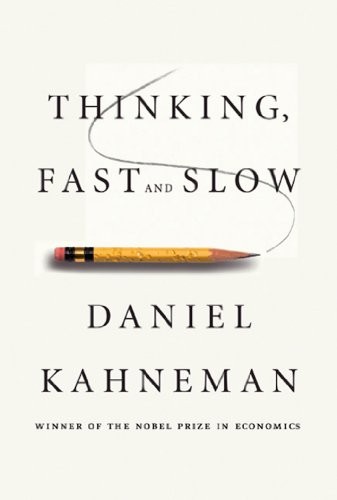Check nearby libraries
Buy this book

In this work the author, a recipient of the Nobel Prize in Economic Sciences for his seminal work in psychology that challenged the rational model of judgment and decision making, has brought together his many years of research and thinking in one book. He explains the two systems that drive the way we think. System 1 is fast, intuitive, and emotional; System 2 is slower, more deliberative, and more logical. He exposes the extraordinary capabilities, and also the faults and biases, of fast thinking, and reveals the pervasive influence of intuitive impressions on our thoughts and behavior. He reveals where we can and cannot trust our intuitions and how we can tap into the benefits of slow thinking. He offers practical and enlightening insights into how choices are made in both our business and our personal lives, and how we can use different techniques to guard against the mental glitches that often get us into trouble. This author's work has transformed cognitive psychology and launched the new fields of behavioral economics and happiness studies. In this book, he takes us on a tour of the mind and explains the two systems that drive the way we think and the way we make choices.
Check nearby libraries
Buy this book

Previews available in: German Dutch Chinese Korean English
Subjects
Intuition, Thought and thinking, Reasoning, Decision making, New York Times bestseller, Long Now Manual for Civilization, Thinking, Kognition, 77.32 intelligence, creativity, New York Times reviewed, Reason, Cognition, Self-actualization (Psychology), Cognitive psychology, Psychology, Schlussfolgern, Entscheidungsfindung, Priming, Spiegel-Bestseller, Verhaltensökonomie, Zwei Systeme, 2970: Taschenbuch / Sachbücher/Politik, Gesellschaft, Wirtschaft, Bf441 .k238 2011, 2012 a-186, Bf 441, Bf 441 k12 2011, 153.4/2, Nyt:hardcover_business_books=2012-02-25, Tankande, Beslutsfattande, Besliskunde, Resonerande, Psykologiska aspekter, Emotions and cognition, TänkandePeople
Richard Thaler, Amos TverskyShowing 10 featured editions. View all 33 editions?
| Edition | Availability |
|---|---|
|
01
Schnelles Denken, langsames Denken
Nov 14, 2016, Penguin Verlag
paperback
in German
3328100342 9783328100348
|
cccc
Libraries near you:
WorldCat
|
| 02 |
dddd
Libraries near you:
WorldCat
|
| 03 |
eeee
|
|
04
Ich denke, also irre ich: wie wir Entscheidungen treffen und was das mit wirtschaft zu tun hat
2012, Siedler
in German
3886808866 9783886808861
|
zzzz
Libraries near you:
WorldCat
|
| 05 |
cccc
Libraries near you:
WorldCat
|
| 06 |
cccc
Libraries near you:
WorldCat
|
|
07
Kuai si man xiang
2012, Tian xia yuan jian chu ban gu fen you xian gong si
in Chinese
- Di 1 ban
9863200611 9789863200611
|
cccc
Libraries near you:
WorldCat
|
|
08
Thinking, fast and slow
2011, Allen Lane, Farrar Straus Giroux
Hardcover
in English
1846140552 9781846140556
|
eeee
Libraries near you:
WorldCat
|
|
09
Thinking, fast and slow
2011, Farrar, Straus and Giroux
hardcover
in English
- 1st ed.
0374275637 9780374275631
|
aaaa
Libraries near you:
WorldCat
|
| 10 |
eeee
Libraries near you:
WorldCat
|
Book Details
Table of Contents
Edition Notes
Includes bibliographical references and index.
Classifications
The Physical Object
ID Numbers
Source records
Library of Congress MARC recordLibrary of Congress MARC record
Library of Congress MARC record
Library of Congress MARC record
Library of Congress MARC record
Library of Congress MARC record
Internet Archive item record
marc_openlibraries_phillipsacademy MARC record
marc_openlibraries_sanfranciscopubliclibrary MARC record
Internet Archive item record
Better World Books record
Library of Congress MARC record
Internet Archive item record
Internet Archive item record
marc_columbia MARC record
marc_nuls MARC record
ISBNdb
harvard_bibliographic_metadata record
Work Description
In his mega bestseller, Thinking, Fast and Slow, Daniel Kahneman, world-famous psychologist and winner of the Nobel Prize in Economics, takes us on a groundbreaking tour of the mind and explains the two systems that drive the way we think.
System 1 is fast, intuitive, and emotional; System 2 is slower, more deliberative, and more logical. The impact of overconfidence on corporate strategies, the difficulties of predicting what will make us happy in the future, the profound effect of cognitive biases on everything from playing the stock market to planning our next vacation―each of these can be understood only by knowing how the two systems shape our judgments and decisions.
Engaging the reader in a lively conversation about how we think, Kahneman reveals where we can and cannot trust our intuitions and how we can tap into the benefits of slow thinking. He offers practical and enlightening insights into how choices are made in both our business and our personal lives―and how we can use different techniques to guard against the mental glitches that often get us into trouble. Topping bestseller lists for almost ten years, Thinking, Fast and Slow is a contemporary classic, an essential book that has changed the lives of millions of readers.
Links outside Open Library
Community Reviews (0)
Feedback?History
- Created July 29, 2011
- 31 revisions
Wikipedia citation
×CloseCopy and paste this code into your Wikipedia page. Need help?
| September 1, 2024 | Edited by Drini | Rm wrong ia id |
| August 27, 2024 | Edited by MARC Bot | import existing book |
| August 4, 2024 | Edited by WikidataBot | [sync_edition_olids] add wikidata identifier |
| February 19, 2024 | Edited by leeand | Added ISBN 10 code |
| July 29, 2011 | Created by LC Bot | Imported from Library of Congress MARC record |






















